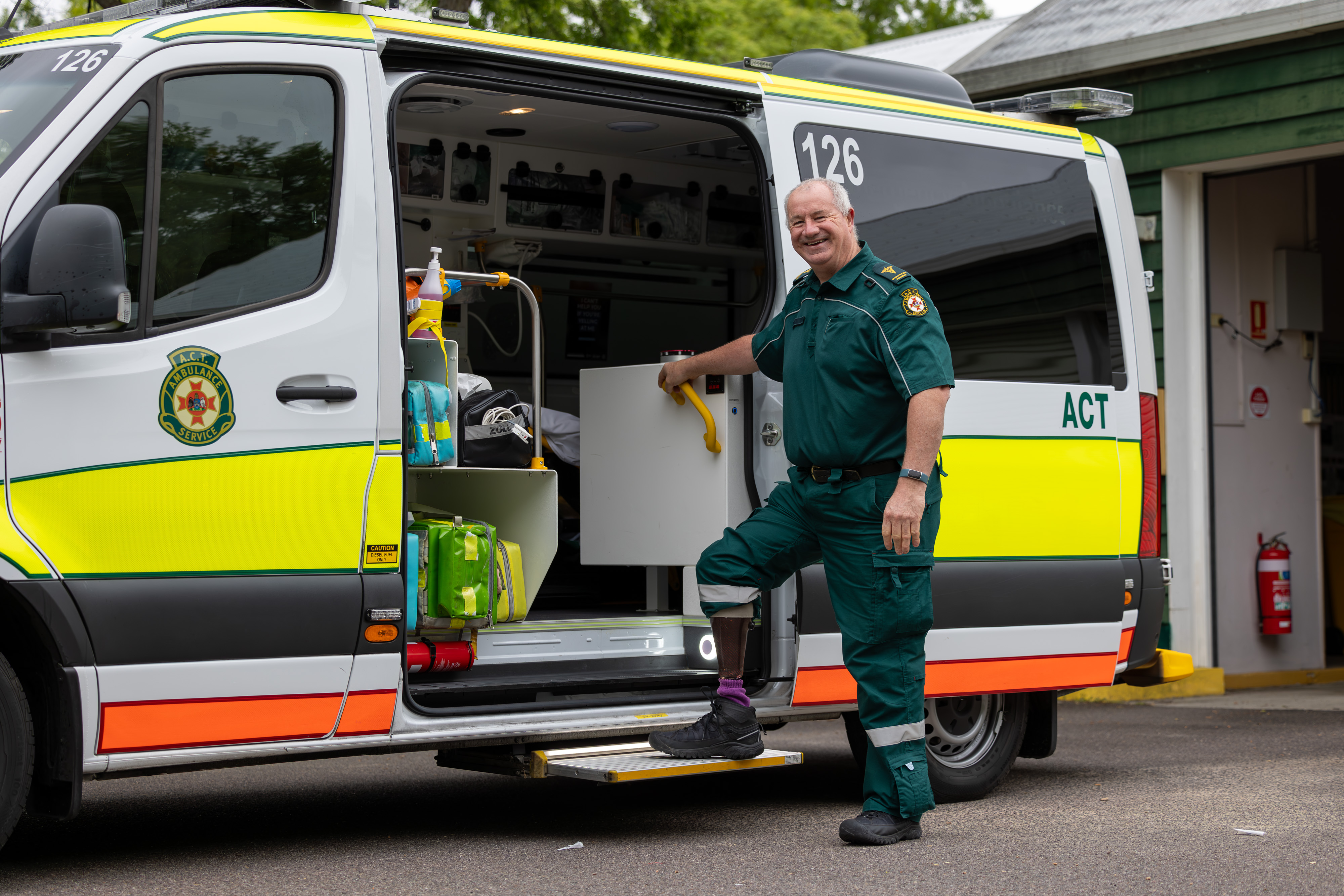When intensive care paramedic Glenn Noonan was told he was going to lose part of his leg, he knew that he would find a way to return to work in the job that he loves.
Glenn started his career as a paramedic in New South Wales, back in 1993. After nearly a decade, he transferred to the Australian Capital Territory to do a bridging conversion course, before qualifying as an intensive care paramedic in 2003, a role that he’s been in ever since.
“I have a real love and passion for this job,” says Glenn.
“I like helping people and making a positive difference in their lives. It is satisfying to come to work every day and do something meaningful.”
Glenn says the job has changed a lot since the early 1990s, but the dedication of the people who enter the ambulance service is still inspiring.
“It’s great to see younger people coming through the ranks,” says Glenn.
“The modern equipment that we now have allows us to better assess and look after patients, compared to when I started.”
“The improved technology enables us to better manage our patients and it helps ensure that they arrive at hospital in a hopefully much healthier condition than if we hadn’t intervened.”
Glenn himself was in a perfectly healthy condition late last year, when things suddenly took a turn for the worse, resulting in him losing the lower part of his right leg.
“I like to tell people that it was a crocodile attack,” laughs Glenn, “but nobody believes me!”
“In truth, I just contracted a really nasty bacterial infection in my foot, which doctors found very unusual, as there was no evidence of a bite wound or scrape.”
Over a period of four days, Glenn’s health deteriorated rapidly, and he was urgently transferred by NSWAS from Goulburn Base Hospital to Canberra Hospital. It was there that the vascular surgeon presented Glenn with a terrible choice.
“The doctor told me either the lower part of my leg had to be removed, or I would not make it to lunchtime,” remembers Glenn.
“The surgeon explained that removing part of my leg was the only way to stop the spread of bacteria, which was trying really hard to kill me. It was a harrowing situation to be faced with and I was an emotional mess.”
Glenn says he was extremely grateful to for the support that he received from family and friends.
“My first real contact with the ambulance was my wonderful friend Sarah Gray and she was extremely emotionally supportive,” says Glenn.
“She’s part of the peer support network, so I guess her training kicked in, and she really helped me, especially in that first 20 minutes after being told the terrible news.”
“I also got fantastic support from friends who had already retired but came out of the woodwork to visit me in hospital, or provide emotional support from as far away as Queensland.”
Going through this kind of experience would be enough to rattle anyone, but Glenn was determined that losing part of his leg wouldn’t stop him from returning to work as a paramedic or doing the activities that he liked.
“In this situation there were two decisions that I had to make,” says Glenn.
“The first one was easy: did I want to live or die? I made that decision very quickly.”
“The second decision was: am I going to spend the rest of my life sitting on the lounge, feeling sorry for myself, and expecting the world to owe me a living? Or am I going to get up and live? I’ve chosen to live.”
Since recovering from the procedure, Glenn has his driver’s license back, has been highly active with his camper trailer, and has even driven up to Cape York for a second time. He has also fallen in love with his new partner, who he says has been incredibly supportive, and managed to arrange a surprise birthday party several weeks ago with many of his close friends and colleagues.
Glenn had to go through some significant assessments before returning to work as a paramedic, but he passed them all with flying colours and is grateful to be back in the job.
“Returning to work has been amazing because it has got me back to what is my normal,” says Glenn, “and my work partners have been really supportive.”
“I hope to return to full duties as an intensive care paramedic in the next couple of months.”
Glenn says the experience has given him a whole new outlook on life.
“I guess when you go and knock on the big, wooden door and no one’s home, and you get a chance to come back, life changes and it really resets your priorities,” says Glenn.
“Nothing phases me anymore; I don’t let anything worry me.”
